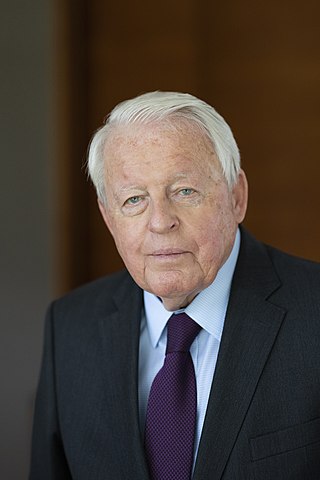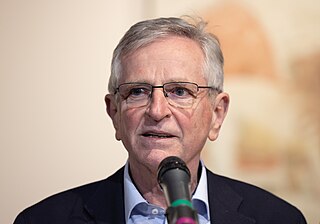
Politics in Austria reflects the dynamics of competition among multiple political parties, which led to the formation of a Conservative-Green coalition government for the first time in January 2020, following the snap elections of 29 September 2019, and the election of a former Green Party leader to the presidency in 2016.

Karl Renner was an Austrian politician and jurist of the Social Democratic Workers' Party of Austria. He is often referred to as the "Father of the Republics" because he led the first government of the Republic of German-Austria and the First Austrian Republic in 1919 and 1920, and was once again decisive in establishing the present Second Republic after the fall of Nazi Germany in 1945, becoming its first President after World War II.

Viktor Klima is an Austrian Social Democrat politician and businessman. He was chancellor of Austria from 1997 to 2000.

The Revolutionary Front for an Independent East Timor is a centre-left political party in East Timor. It presently holds 23 of 65 seats in the National Parliament. Fretilin formed the government in East Timor until its independence in 2002. It obtained the presidency in 2017 under Francisco Guterres but lost in the 2022 East Timorese presidential election.

Bruno Kreisky was an Austrian social democratic politician who served as foreign minister from 1959 to 1966 and as chancellor from 1970 to 1983. Aged 72, he was the oldest chancellor after World War II.

Franz Vranitzky is an Austrian politician. A member of the Social Democratic Party of Austria (SPÖ), he was Chancellor of Austria from 1986 to 1997.

Alfred Gusenbauer is an Austrian politician who until 2008 spent his entire professional life as an employee of the Social Democratic Party of Austria (SPÖ) or as a parliamentary representative. He headed the SPÖ from 2000 to 2008, and served as Chancellor of Austria from January 2007 to December 2008. Since then, he has pursued a career as a consultant and lecturer, and as a member of supervisory boards of Austrian companies.

Jyrki Tapani Katainen is a Finnish politician who served as the European Commission's Vice-President for Jobs, Growth, Investment and Competitiveness from 2014 until 2019. Katainen was previously prime minister of Finland from 2011 to 2014 and chairman of the National Coalition Party from 2004 to 2014. He was succeeded by Alexander Stubb as chairman of Finland's National Coalition Party. After stepping down as prime minister, Katainen was elected as European Commission Vice-President in July 2014.

Legislative elections were held in Austria on 1 October 2006 to elect the 23rd National Council, the lower house of Austria's bicameral parliament.

The Gusenbauer government was sworn in on 11 January 2007 and left office on 2 December 2008.

Wilhelm Molterer is an Austrian politician who currently serves as the managing director of the European Fund for Strategic Investments (EFSI). Between 2011 and 2015 he was the vice-president and member of the Management Committee of the European Investment Bank (EIB). Before joining the EIB, he was Member of the Austrian Parliament. He has been Vice Chancellor and Finance Minister of Austria and chairman of the conservative Austrian People's Party.

Austria was occupied by the Allies and declared independent from Nazi Germany on 27 April 1945, as a result of the Vienna offensive. The occupation ended when the Austrian State Treaty came into force on 27 July 1955.

Günther Platter is an Austrian politician for the Austrian People's Party (ÖVP) and was the governor of Tyrol between 2008 and 2022, succeeding Herwig van Staa. Before becoming governor, Platter served as interior minister and as Minister of Defence in the cabinets of Gusenbauer and Schüssel.

The Freedom Party of Austria is a political party in Austria, variously described as far-right, right-wing populist, national-conservative, eurosceptic and russophile. It has been led by Herbert Kickl since 2021. It is the largest of five parties in the National Council, with 57 of the 183 seats, and won 28.85% of votes cast in the 2024 election and it is represented in all nine state legislatures. On a European level, the FPÖ is a founding member of the Patriots.eu and its six MEPs sit with the Patriots for Europe (PfE) group following the dissolution of its predecessor, Identity and Democracy (ID).
Norbert Steger is an Austrian lawyer and former politician for the Freedom Party of Austria (FPÖ). He was the FPÖ party leader from 1980 to 1986, and Vice Chancellor and Federal Minister for Trade, Commerce and Industry from 1983 to 1987.
The Salzburger Nachrichten is a German-language daily newspaper published in Salzburg, Austria. It has been in circulation since 1945.

Oronzo Reale was an Italian politician, who served as justice minister in the 1960s and 1970s.
The Democratic Progressive Party was a right-wing populist political party in Austria. The DFP was founded in September 1965 by former Austrian Trade Union Federation chairman and Minister of the Interior Franz Olah upon his expulsion from the Socialist Party of Austria. The party was known for its leader's antisemitic rhetoric, and received almost 150,000 votes in the 1966 legislative election, in which it failed to win a seat in the Federal Council. The party disbanded in 1970.

Ferdinand Lacina is an Austrian politician. He served as finance minister from 1986 to 1995.















